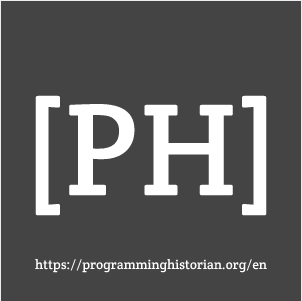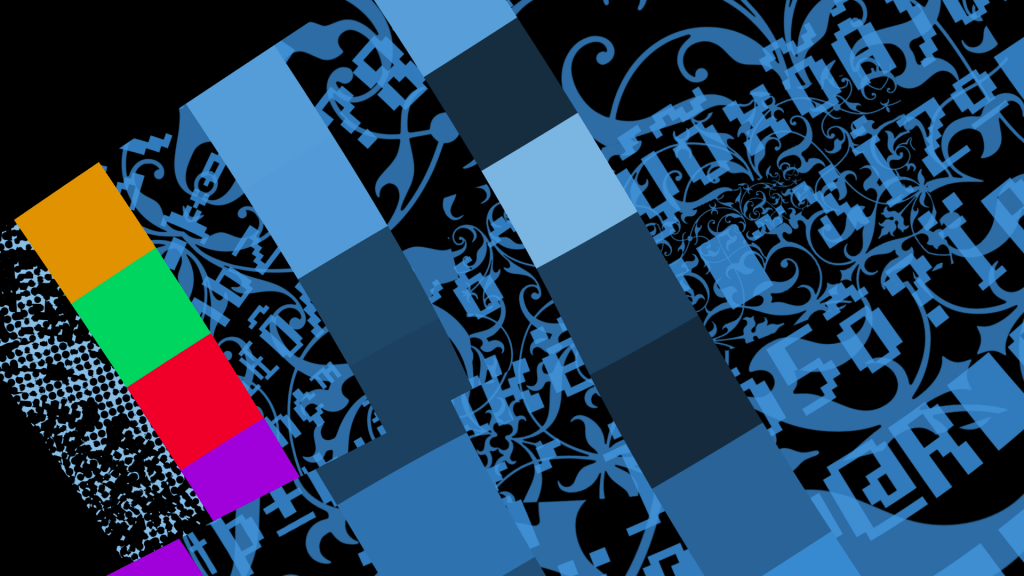Blowing the doors off debt: mapping global interactions of a community project
By Oliver W Duke-Williams, on 27 May 2021
The film Bank Job by Daniel Edelstyn and Hilary Powell is an exploration of the world of credit and of capital creation, and the buying and selling of debt. The film follows a community project in which artists Edelstyn and Powell create their own currency, set up as a bank, and sell bank notes in order to fund the purchase at discount of over a million pounds of debt. The culmination of the film is the cancellation of that debt, both financially (the debt written off) and symbolically, in an exploding van.
Whilst conceived and implemented at a community level in the London Borough of Waltham Forest, it was an undertaking which attracted international interest. The currency created by Powell as hand-printed notes and bonds were bought by a diverse group of people, both individuals and institutions including the V&A Museum, and it was a pleasure to work with the film makers to explore some of the extent of this interest.
‘Technology & the Historian: Transformations of the Digital Age’ Workshop & Book Launch
By Adam Crymble, on 23 April 2021
Lessons from history, options for today.
Thursday 29 April 2021 – 12pm-1pm (Zoom)
Join Dr. Adam Crymble for a free Programming Historian Teaching Workshop to celebrate the launch of his new book, Technology & the Historian: Transformations of the Digital Age, the first comprehensive history of historical studies in the digital age.
Collectively, we’ve been teaching digital history for decades. But not as consistently as you might imagine. This workshop and book launch, aimed at practicing and future teachers of history at university level, showcases the shifting approaches to digital history pedagogy in the past thirty years.
Building on that knowledge, and drawing on the tutorials of Programming Historian, as well as Crymble’s ten years on the project, he offers practical classroom-ready solutions that bring together history and technology for students today.
Upgrade how you teach historiography for the twenty-first century, by learning what came before and what can come next.
All attendees eligible for 30% discount on the book.
Opening the ‘black box’ of digital cultural heritage processes: feminist digital humanities and critical heritage studies
By Lucy Stagg, on 22 February 2021
Published on behalf of Hannah Smyth. This post introduces a book chapter co-authored by myself, Julianne Nyhan, and Andrew Flinn. It was published as part of the Routledge Handbook of Research Methods in Digital Humanities in August 2020 and edited by Kristen Schuster and Stuart Dunn (Kings College London). This edited volume seeks to address collaboration and inter-/intra-disciplinarity in DH through different perspectives on method (Dunn and Schuster, 2020). Our contribution – ‘Opening the “black box” of digital cultural heritage processes: feminist digital humanities and critical heritage studies’ – is placed within the theme: remediation and transmission. We the authors are members of the international research consortium ‘Critical Heritage and the Future of Europe’ (CHEurope) and its sub-group on Digital Heritage. It is in this context that each of our perspectives and research interests came together in the chapter.
The aim of the review chapter is to highlight the resonances between Feminist Digital Humanities and Critical Heritage Studies (CHS), and to trouble the ways in which ‘method’ is instrumentalised in transformative research agendas. A clear relationship exists between digital humanities and digital cultural heritage more broadly, perhaps the most facile and wide-ranging of examples being the digitisation of heritage texts and materials. Despite this affinity, our approach also stemmed from the observation that there has been comparatively little recognition of (digital) heritage as a socially constructed phenomenon – the raison d’être of CHS – within DH (Lutz, 2017).
Intersectional feminist DH is, however, at the frontier of a flourishing critique of techno-social inequities, exemplified by recent publications such as Bodies of Information (Losh and Wernimont 2018), Algorithms of Oppression (Noble, 2018) and Data Feminism (D’Ignazio and Klein 2019). We therefore sought in this chapter to bridge these two scholarly movements that are challenging the oppressive subjectivities and epistemologies of their respective fields – predominantly white, masculine, heteronormative, Eurocentric – and their far-reaching implications.
Firstly, we introduce the state of cultural critique in the field of DH since the turn of the century that foregrounds gender (as well as race, class and sexuality) as a mode of analysis. This covers, inter alia: feminist technology studies; algorithmic, digital resource, and interface critique; digital archives; computational analysis techniques; the gender politics of certain kinds of ‘expertise’ in DH; and representation in the field.
Next we turn to ‘gender and heritage’, a perspective with a long and dispersed history at the margins (Reading, 2015;Wilson, 2018) and which is now carving out its own place in the rights-based, dissonant, and transformative worldview that is the purview of CHS. If CHS calls into question the heritage that ‘privileges old, grand, prestigious, expert approved sites, buildings and artefacts that sustain Western narratives of nation, class and science’(ACHS, 2012) feminist CHS further shatters the notion that heritage is somehow un-gendered and without consequence for how we perceive ourselves and others in the world.
Digitality has heralded novel questions, and less novel continuities, in the heritage field and which are all too familiar to the feminist DH scholars whose work underpins this chapter. Feminist DH and gender CHS share a concern with the false and learned assumptions about objectivity and neutrality, and the way that power and social roles are performed, valued and devalued through technology and heritage. We therefore thirdly suggest digital heritage as a critical bridging point between these areas of shared concern.
Lastly, and underpinning our contribution to this volume on methods is a provocation to reflect upon research approaches and methods themselves whose normative ontologies may (re)produce dynamics of power, inequity, and othering. Many taken-for-granted methodologies have their origins in, for example, colonial attitudes and practices. Digital tools and approaches (indeed professional paradigms) are more often extractive or, by their codifying nature, limit ‘authorised’ types of knowledge and interpretation. Might we reconfigure such methods for transformative ends or seek alternatives?
The final space of this chapter is given to a reflection on oral history (at its core in the feminist and social justice tradition) as an example of method that traverses both feminist DH and CHS and with which, we suggest, it is conceptually allied. Previous oral history work carried out by Julianne and Andrew has uncovered hidden and gendered histories of the digital humanities itself, and the feminised labour behind the pioneering work of Fr. Robert Busa’s Index Thomisticus (Nyhan and Flinn, 2016; Nyhan, Forthcoming). Looking to the future, digital oral history presents us with many possibilities (and challenges) as yet unrealised to bring computational methods of analysis and a feminist DH lens to bear upon the spoken record of the past.
The chapter is freely available to download as a pdf from the UCLDH website
References:
D’Ignazio, Catherine, and Lauren Klein. Data Feminism. MIT Press, 2019.
Grahn, Wera, and Ross J Wilson, eds. Gender and Heritage: Performance, Place and Politics. London and New York: Routledge, 2018.
‘2012 Manifesto.’ Association of Critical Heritage Studies. Accessed August 1, 2018. http://www.criticalheritagestudies.org/history/.
Losh, Elizabeth, and Jaqueline Wernimont, eds. Bodies of Information: Intersectional Feminism and Digital Humanities. Minneapolis: University of Minnesota Press, 2018.
Lutz, S. ‘{D1G1TAL HER1TAGE}. From cultural to digital heritage,’ Hamburger Journal für Kulturanthropologie, 2018 (7) 3–23.
Noble, Safiya Umoja. Algorithms of Oppression: How Search Engines Reinforce Racism. How Search Engines Reinforce Racism. New York: New York University Press, 2018.
Nyhan, Julianne and Andrew Flinn. Computation and the Humanities: Towards an Oral History of Digital Humanities. Springer Series on Cultural Computing. Springer International Publishing, 2016.
Nyhan, Julianne. Forthcoming. Hidden and Devalued Labour in the Digital Humanities: On the Index Thomisticus Project 1954-67. Routledge.
Reading, Anna. ‘Making Feminist Heritage Work: Gender and Heritage.’ In Handbook of Contemporary Heritage Research, edited by Emma Waterton and Steve Watson, 397–413. Basingstoke: Palgrave Macmillan, 2015.
Smyth, Hannah, Julianne Nyhan, and Andrew Flinn. ‘Opening the “black box” of digital cultural heritage processes: feminist digital humanities and critical heritage studies.’ In Routledge International Handbook of Research Methods in Digital Humanities, edited by. Kristen Schuster and Stuart Dunn, 295–308. Routledge, 2020.
MA / MSc Digital Humanities Applications Open for 2021-22
By Adam Crymble, on 3 February 2021
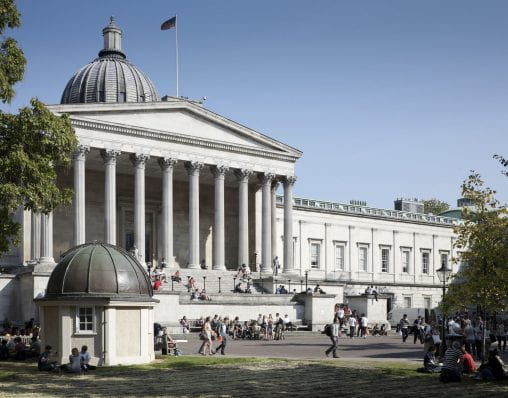
Caption: Photograph of UCL Campus in London.
UCL’s Department of Information Studies is currently accepting applications for the 2021-22 cohort of its MA in Digital Humanities and MSc in Digital Humanities programmes. Programme lead, Dr. Julianne Nyhan writes, ‘this exciting, interdisciplinary programme offers students a unique opportunity to explore and analyse the application of digital technologies to the cultural record of humankind and, in doing so, to reflect on how technology is impacting all aspects of how we live now, and in the future.’
Both programmes are taught by a range of staff, including members of the UCL Centre for Digital Humanities. Potential applicants are invited to contact the Admissions tutor with any questions. For 2021-22 applicants, this is Dr Adam Crymble (a.crymble@ucl.ac.uk).
Stock Illustrations, Free to Reuse
By Rudolf Ammann, on 2 February 2021
In spring last year the UCLDH co-founder Melissa Terras invited me to join her and Gavin Inglis on an unusual project. For whatever comedy might be had from the undertaking, the project trained artificial neural networks on several years’ worth of historical Edinburgh Fringe festival programmes to generate new virtual show listings. My brief at first consisted in developing the brand identity and building the website, but, having familiarised myself with the project, I suggested that the purely textual show listings should also be accompanied by illustrations, which I’d be happy to create and supply. The suggestion was accepted. So, at the start of the Festival in August, the project went live under the name ImprovBot.ai, and it kept churning out a dozen illustrated AI-generated show listings a day for three weeks on end.
The images are now available for creative re-use as non-restrictively licenced stock illustrations. Here’s some very brief discussion and a few pointers to the various ways of getting hold of the images.
Producing digital illustrations by the hundreds requires a certain serial approach to their manufacturing, so it helps to have archives on hand that can be drawn on for visual elements to tweak and recombine. I have documented the main elements in the ImprovBot.ai series elsewhere. In this post, let me just highlight some of the threads that tie this illustration series to previous work I’ve done for Melissa and UCLDH.
As a designer and a visual artist I have been collaborating with Melissa for more than a decade. Prior to ImprovBot.ai (see Melissa’s account of her recent adventures in AI, incidentally), we’ve worked together on a variety of projects, including her book The Professor in Children’s Literature, which I typeset and whose book cover I designed. This cover, along with a few other references to other prior art that I’ve manage to sneak in, is among the elements I’ve used repeatedly as part of the series’ ‘extras‘:
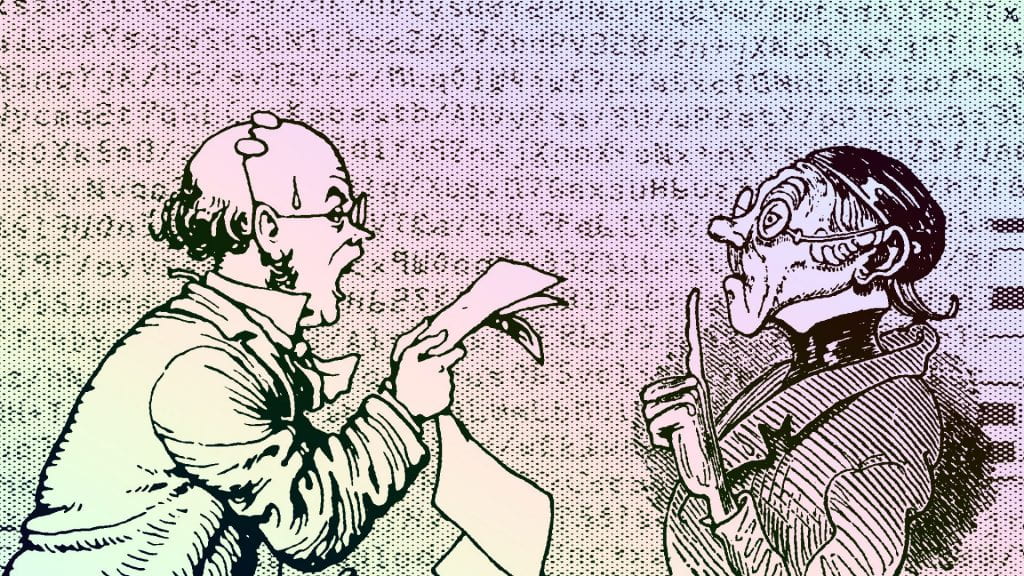
Book cover remix: Professor Branestawm and Lehrer Lämpel (drawings by W. Heath Robinson and Wilhelm Busch, respectively)
The extras, as their name suggests, are perhaps not very central to the ImprovBot.ai series. By contrast, glitch captures are a frequently used element. Typically consisting of arbitrarily coloured pixel strings, they appear in many image compositions in the series. The pixels are sampled from image files and screen renderings that have gone haywire for some reason, provoked or unprovoked. They are drawn from the same stock of materials I’ve previously used around UCLDH to complement and expand upon the Centre’s pixel-looking logo. Here’s a plain example of the barely processed source material:
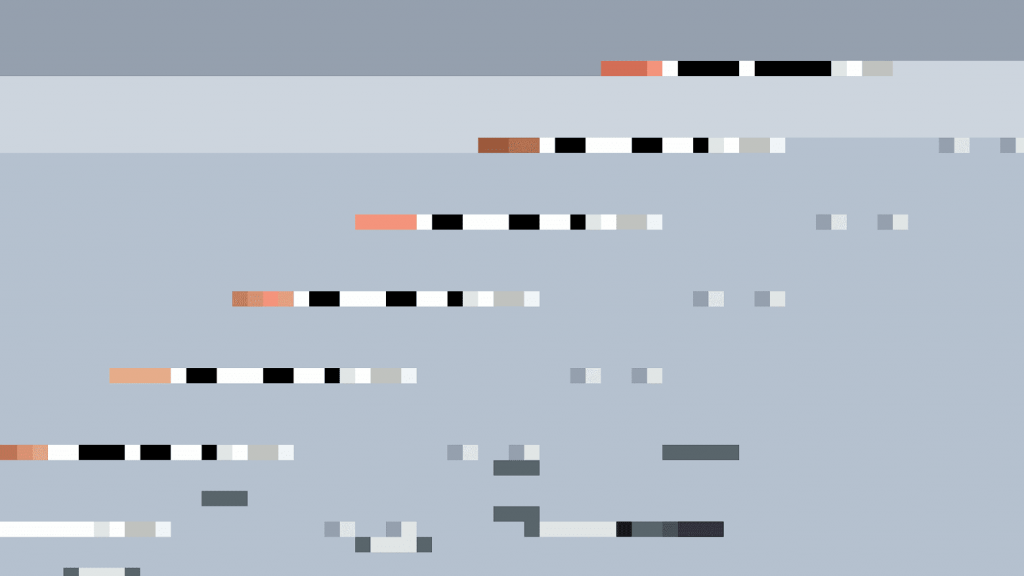
Glitch capture, enlarged from a screenshot taken of an unintended rendering issue provoked by low random-access memory (RAM)
Some of the illustrations are more complex in their make-up, featuring other elements thrown into the mix, such as moresque patterns and mojibake:
Availability
The whole set of Improvbot.ai illustrations is available for reuse and can be picked up individually from the project website and the Twitter feed. The images , briefly reviewed by category on a separate page, can also be browsed by these categories. The categories most suitable for re-use are probably these:
Moresque | Capture | Dataviz | Base64 | Network | Hardmod | Mojibake | Noise | Extras
Also available, but perhaps less suitable for reuse might be these categories:
Identity: ImprovBot | Identity: Improverts | The Bot, incl. Multiples Edinburgh and Multiples Shakespeare |
A zip archive of the full illustration set is available for downloading from Zenodo.org, and a subset of individual illustrations is distributed via Pixabay.com.
Licensing and Reuse
The illustrations are distributed under the CC-BY-NC licence, the image set on Pixabay under even less restrictive terms.
Some of the images might be suitable for book cover art, a blog post illustration, or they might inspire you to simply play with them and produce a few remixes of your own. We’re looking forward to seeing them show up in unexpected places!
Semantic Web for Cultural Heritage special issue now published
By Lucy Stagg, on 1 February 2021
UCLDH member, Antonis Bikakis, has co-edited (along with four other colleagues from France, Italy and Finland) the Semantic Web for Cultural Heritage special issue, which is now published and freely available to read in Semantic Web- Interoperability, Usability, Applicability, volume 12(2), 2021.
The papers cover a wide spectrum of modelled topics related to language, reading and writing, narratives, historical events and cultural artefacts, while describing reusable methodologies and tools for cultural data management.
Grab a discount on ‘One Origin of Digital Humanities’
By Lucy Stagg, on 22 January 2021
Following a highly successful book launch on 20th January, we are pleased to be able to offer everyone a 20% discount off the book, One Origin of Digital Humanities: Fr Roberto Busa S.J. in His Own Words, edited by Julianne Nyhan and Marco Passarotti ( Springer 2020).
Roberto Busa S.J. is often described as one of the founders of the field now known as Digital Humanities, but many of his writings are difficult to access. One Origin of Digital Humanities: Fr Roberto Busa S.J. in His Own Words draws on extensive archival research to select and contextualise previously out of print or inaccessible writings of Busa, translated into English for the first time.
Use the following token on Springer.com for 20% off: Aqgemj8rWgBNJNm / Valid Jan 20, 2021 – Feb 17, 2021
Enlightenment architectures: The reconstruction of Sir Hans Sloane’s cabinets of ‘Miscellanies’
By Lucy Stagg, on 9 December 2020
UCLDH Director Dr Julianne Nyhan and Dr Kim Sloan, the Francis Finlay Curator of the Enlightenment Gallery at the British Museum, have recently had an article published by the OUP Journal of the History of Collections. The article is based on their work undertaken as part of the Leverhulme Trust-funded research project, Enlightenment Architectures: Sir Hans Sloane’s Catalogues of his Collections (2016–19), a collaboration between the British Museum and University College London. Abstract:
Focusing on Sir Hans Sloane’s catalogue of ‘Miscellanies’, now in the British Museum, this paper asks firstly how Sloane described objects and secondly whether the original contents of the cabinets can be reconstructed from his catalogue. Drawing on a sustained, digitally augmented analysis – the first of its kind – of Sloane’s catalogues, we respond to these questions and offer an initial analysis of the contents of the cabinets that held the miscellaneous objects at Sloane’s manor house in Chelsea. Knowledge of how and why Sloane catalogued this part of his collection has hitherto remained underdeveloped. We argue that his focus on preservation and documentation in his cataloguing did not preclude a research role, but rather was founded on immersive participation.
New Programming Historian Partnership
By Adam Crymble, on 8 December 2020

UCLDH is proud to announce its support for Programming Historian, by joining their Institutional Partnership Programme. For the past decade, Programming Historian has been an integral part of the digital humanities teaching and learning infrastructure, with more than 140 open access peer-reviewed tutorials published in 4 languages. With many universities around the world still not offering adequate digital skills training to their staff or students, projects such as this one remain crucial.
Our own lecturer of Digital Humanities, Adam Crymble, is one of the founding editors of the project, and has been an integral part of their push towards sustainable open access publishing models in digital humanities. He looks forward to deepening the links between UCL and Programming Historian, and welcomes queries from UCL colleagues looking for support to integrate Programming Historian tutorials in their remote teaching offerings or postgraduate training programmes.
Centre Director, Julianne Nyhan says. ‘This open access, peer reviewed resource supports the teaching and learning of Digital Humanities across the world. It scaffolds new, emerging and established Digital Humanists to tinker, play, critique, imagine and make digital resources, in other words, to make the Digital Humanities their own. We are delighted to have the opportunity to support the excellent work of Programming Historian’.
With thanks to the Department of Information Studies for financial support.
Report on the Explore Archives event at the Marx Memorial Library
By Lucy Stagg, on 26 November 2020
Report written by Marco Humbel
The Marx Memorial Library (MML) and UCLDH/DIS regularly collaborate for facilitating research projects, student seminars and work placements. On the 16th October 2020 the MML held the online event ‘Explore Archives: Marking the centenary of the foundation of the Communist Party’. ‘Explore Archives’ was funded and co-organized by the Society for the Study of Labour History. The event’s objectives were to map archival resources on the Communist Party, spark interest for further areas of inquiry, and to develop archival research skills of attendees.
Professor Mary Davis (Royal Holloway, University of London/MML) introduced the field of historical research on the Communist Party in the first session. Davis reflected for this purpose on the research process on the new book ‘A centenary for Socialism: Britain’s Communist Party 1920-2020’, which she edited. The publication provides an extensive overview on the history of the party from political, economical and ideological perspectives. Yet, numerous areas have the potential to be investigated further, such as the history of women, trade unionism, or international solidarity.
The following panel discussion included contributions from Simon Sheppard (People’s History Museum), Lesley Ruthven (Goldsmiths, University of London), and Meirian Jump (MML). The session was chaired by Janette Martin (John Rylands Library). Each of the archives has its own focal point and unique resources. Particular strength of the People’s History Museum is for instance the minutes of the Communist Party’s central bodies like the Executive Committee, the national congresses, or the Women’s Department. The museum is also custodian of personal papers of prominent party members, like James Klugmann or the historian Dona Torr. The personal papers of another party’s historian – Noreen Branson – can be found in the MML. The Marx library also holds the papers of London branches of the Communist Party, including Bethnal Green and Hornsey, as well as collections that document international campaigns, such as the Aid Spain Movement. As a specialized collection for performing arts and social sciences, the Archives of Goldsmith’s University of London holds various song books from the labour movement, and among others the personal papers of drama scholar and party member Margot Heinemann.
The final session was titled ‘Access To Digital Resources Workshop’. Marco Humbel (UCL/MML) started the presentation with outlining the MML’s rational for its digitization activities, and the criteria for selecting collection items for digitization. The main part of the workshop aimed to map the digital resources available on the Communist Party online, including the photograph collection of the Daily Worker/Morning Star, the Aid Spain Banners and the poster collection. The session closed with an overview on the UK Archives Hub, and the Social History Portal. Both platforms facilitate to search across multiple archival repositories. Thus, they can be the starting point for exploring other archives specialized on the labour movement like the library of Trade Union Congress, or Working Class Movement Library.
 Close
Close




